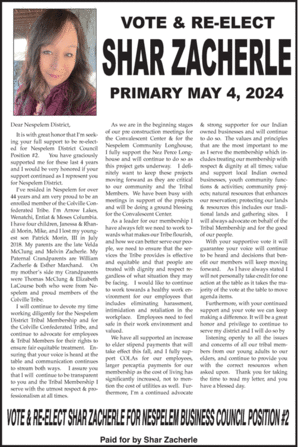Something’s fishy with new rules written by unseen bureaucrats
Last updated 7/11/2012 at 1:44pm
Thinking about having fish for dinner tonight? How about some fish for breakfast, lunch and dinner tomorrow? And the next day? And the day after that. The Washington State Department of Ecology wants to assume that you do. For the purpose of tightening regulations, the DOE is racing to increase the state’s estimate of fish consumption by as much as 2,200 percent - and they want to do it by the end of the year.
Why is the fish consumption rate important? Increasing the estimate would give Olympia bureaucrats the rationale they need to impose tighter limits on water quality discharge permits, as well as costlier sediment and cleanup rules. Water quality regulations are based, in large part, on the department’s estimate of fish consumption. The more fish the government says we eat, the more power unelected bureaucrats have to impose harsher water rules. And right now - because there is no legislative authority over the rule-making process - there isn’t a thing your lawmaker can do about it.
Currently, the state estimates the average person in Washington eats at least 6.5 grams of fish each day. Under the new rules, DOE officials want to change their estimates to as much as 275 grams per day. Doing so would mean the state would set policy based on the assumption the average Washingtonian consumed 18 pounds of fish a month. DOE bureaucrats say Oregon did it first, and Washington should follow its lead to make sure high consumers of fish have a healthier product on their plate.
Many of those high consumers, according to the DOE, are the state’s Native Americans, who make up less than 2 percent of the state’s population. The state insists basing consumption rates for the whole state on such a tiny percentage is appropriate. The proposed rule changes are not based on science but statistical projections.
Officials admit the sudden rule change will be “a challenge for dischargers.” In fact, most state agencies offer that empty concession whenever they talk about imposing expensive new rules. And yet they impose them anyway - at a cost to businesses, consumers and the state economy. Do the rules actually work? No one knows.
Perhaps that is why Gov. Chris Gregoire - in the midst of a struggling economy - temporarily suspended rule-making authority in 2010. She had good reason. Total state regulations fill more than 32 phonebook-size volumes, which together form a stack five feet high. Each and every rule has the force of law. How in the world do we expect our state businesses - particularly small businesses - to follow each and every rule in those 32 volumes? The answer is they can’t. State officials simply choose to enforce some rules and not others, keeping business owners in a constant state of worry.
In the end, the governor’s suspension had too many loopholes, so most state agencies merrily continued with business as usual.
Other states recognize the need to reform the rule-making process to make it more predictable and fair. Each regulation, on its own, is unlikely to break a business. However, thousands of rules piled one upon the other add up to a significant burden.
Lawmakers do have two ways to change the system. First, they could require that all agency rules include a sunset date. That means they would expire every five years and need re-authorization. At that time, the people, the Legislature and the governor could review the rule to determine if it was effective. Today, thousands of rules continue on the books long after lawmakers have forgotten why they were created in the first place.
Second, legislators could require state agencies to get legislative approval of new rules. This provides transparency in two ways: elected lawmakers would have the ultimate say, and citizens could see the debate unfold on the legislative floor, instead of in backroom state agency offices.
It is important for policymakers to recognize these recommendations are not intended to repeal rules that would jeopardize public safety or the well-being of others.
In this latest example, state bureaucrats have provided little evidence that a fish consumption rate 2,200 percent higher than the current one is warranted. Perhaps these invisible policymakers are simply following an old proverb with a bit of a twist: give a man a fish, feed him for a day; give a bureaucrat a new rule, feed him for a lifetime.
Chris Cargill is the Eastern Washington director for Washington Policy Center, a nonprofit, nonpartisan research organization within Washington state. Learn more at washingtonpolicy.org.





Reader Comments(0)